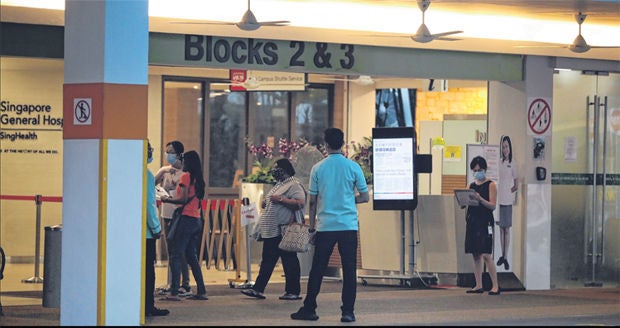
A digital medical certificate, which can be accessed via a URL and sent to a patient in an SMS, eliminates the need to submit a hard copy to the employer or request a replacement if it was misplaced. However, paper MCs will still be provided for those who do not own mobile phones or do not have mobile numbers registered with the healthcare institution.
Patients visiting hospitals, polyclinics and most national speciality centres under SingHealth will receive digital medical certificates (MC) instead of hard-copy versions from tomorrow.
The new DigiMC system that was developed by the Government Technology Agency (GovTech) will also be used at private institutions such as Raffles Medical and Mount Alvernia Hospital.
“Digital MCs offer patients greater convenience, streamline clinical and administrative workflows and are environmentallyfriendly,” said Dr Goh Min Liong, SingHealth’s group chief medical informatics officer.
Raffles Medical launched a DigiMC pilot this month and aims to roll out the system fully by June, barring delays arising from the coronavirus situation, a spokesman told The Straits Times.
Mount Alvernia also plans to roll out the system in a few months.
But the system will not be implemented at the National Neuroscience Institute, which is also under SingHealth, from tomorrow, ST understands. This is because it is located at the Tan Tock Seng Hospital campus under the National Healthcare Group (NHG), another public healthcare cluster.
NHG said it intends to use the DigiMC system in the future, and has initiated discussions with Gov- Tech.
Private healthcare provider Parkway Shenton, which is upgrading its electronic medical records system, will also review how its system can interface with DigiMC.
A DigiMC pilot was carried out at all SingHealth institutions in December, the public healthcare cluster said yesterday.
More than 400,000 digital MCs have been issued since the pilot started and over 80 per cent of the more than 17,700 patients surveyed were satisfied with the initiative, said SingHealth.
A digital MC, which can be accessed via a URL and sent to a patient in an SMS, eliminates the need to submit a hard copy to the employer or request a replacement if it was misplaced.
Patients get the digital MC via SMS within five minutes of the doctor issuing it during a clinic visit or hospital stay.
A patient unlocks the MC by keying in his date of birth. Once unlocked, patients can forward the SMS or the URL to their employers or relevant parties.
The URL will not expire and patients can access the MC whenever they need it. They can also download and share or print the MC.
As these digital MCs are hosted and displayed on a government domain, employers are better able to determine if the documents received from employees are legitimate.
During the pilot, patients received a digital MC alongside a hard-copy version. Now they will get only a digital one by default, although they can still request a paper version on the same day of their clinic visit or hospital discharge at no charge.
Paper MCs will still be provided for those who do not own mobile phones or do not have mobile numbers registered with the healthcare institution.
Quality technician Malathi Vasudevan, 23, who received a digital MC from Singapore General Hospital (SGH) in January, said that it was a fuss-free process.
“I had accidentally misplaced my
paper MC, which was due for submission
to my employer,” she
added. “Thankfully, SGH had given
me the digital version of it, which I
could easily retrieve online and
print. It saved me a lot of trouble.”
Contributed by














 Get it on Google Play
Get it on Google Play